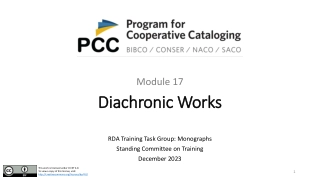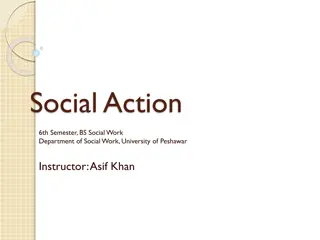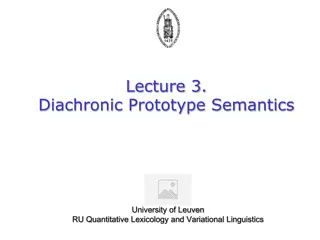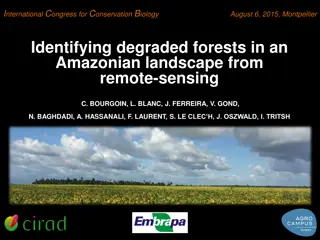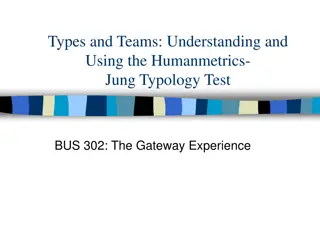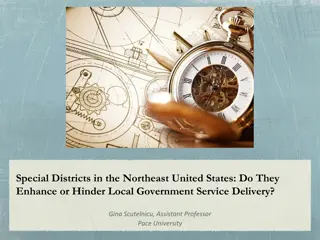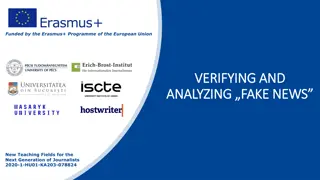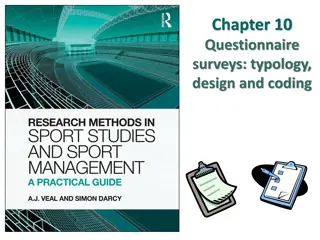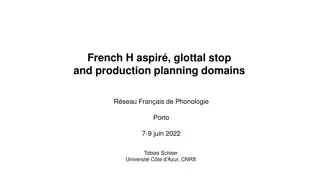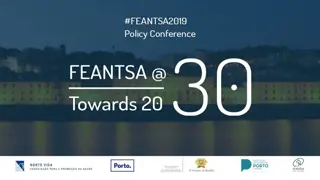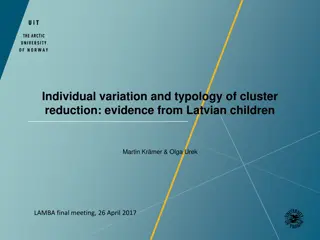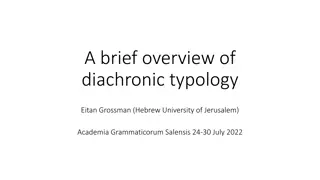Diachronic Works
The concept of diachronic works, learn to distinguish them from static works, understand extension plans, and recognize the significance of WEM lock in determining new works in this RDA training module.
1 views • 67 slides
Understanding Civil Society: Concepts, Challenges, and Implications
Explore the dynamics of civil society, from its dense network of groups to its role in democracy. Delve into the typology of Civil Society Organizations, the connection between civil society and democracy, and the unique landscape of civil society in Norway. Engage in thought-provoking discussions o
0 views • 9 slides
Exploring Queer Language and World
Examining the linguistic aspects of queerness, this content delves into the history and evolution of terms like queer and homosexual. It discusses the reclaiming of queer identity, its association with leftist politics, and the linguistic reclamation process. Various perspectives on queer terminolog
0 views • 24 slides
Understanding Types of Social Action According to Max Weber
Max Weber's sociology delves into the consequences of different types of social action, exploring how these actions can conflict and create tensions in society. Weber's typology categorizes social action into rational-purposeful, value-rational, affective, and traditional actions, highlighting the c
1 views • 10 slides
Evolution of Lexical Categories: A Cognitive Sociolinguistics Perspective
The lecture series at the University of Leuven explores Diachronic Prototype Semantics and its implications for Variational Linguistics. It delves into semasiological, conceptual onomasiological, and formal onomasiological variation in linguistic meaning, emphasizing the role of variability in the e
2 views • 67 slides
Remote Sensing Methods for Identifying Degraded Forests in the Amazon
Using multisource remote sensing data, this study aims to identify and characterize forest degradation in the Amazonian landscape. Field work in Paragominas, Brazil, combined with optical and radar data analysis, helps in understanding carbon stocks and typology of degraded forests. The research foc
3 views • 7 slides
Divine Typology and Foreshadowing in Biblical Narratives
Typology in Christianity involves interpreting Old Testament figures, events, and symbols as foreshadowing future events related to Jesus Christ. By recognizing these divine hints in stories like Joseph and Moses, believers can find reassurance and a deeper understanding of God's plan throughout Scr
0 views • 18 slides
Understanding Humanmetrics-Jung Typology Test and Team Dynamics in Business
This content explores the Humanmetrics-Jung Typology Test and its role in understanding individual behavior within teams. It explains the test indicators based on energy orientation, attention, decision-making, and lifestyle, highlighting how teams can benefit from diverse compositions for enhanced
0 views • 8 slides
Special Districts in the Northeast United States: Enhancing or Hindering Local Government Service Delivery?
Special districts in the Northeast US, independent units of local government, professionalize public service management. They have specialized functions, administrative and financial independence, and low political visibility. The study aims to develop a typology of multi-purpose special districts f
0 views • 12 slides
Understanding Armed Conflict Typology and Vulnerable Countries
This discussion explores armed conflict typology, including active conflict, post-conflict, and conflict-vulnerable states. It outlines definitions, criteria for categorization, and identifies countries in Africa, Latin America, Asia, and the Middle East currently facing fragility or instability ris
0 views • 10 slides
Unveiling the Truth: A Deep Dive into Fake News Phenomenon
Delve into the intricate web of fake news with a comprehensive course funded by the Erasmus+ Programme. Explore the history, definitions, and dangers of fake news alongside the new teaching fields for the next generation of journalists. Meet the author Marian Popovici, a PhD student in Communication
0 views • 39 slides
Understanding Entry and Exit Dynamics in Industries
Explore the fascinating world of entry and exit in industries, from the facts and barriers to Bain's typology of entry conditions and structural entry barriers. Learn about entry deterring strategies such as limit pricing, predatory pricing, and strategic bundling, and how they impact the market lan
0 views • 8 slides
Understanding Questionnaire Surveys: Typology, Design, and Coding
This content explores the world of questionnaire surveys, covering topics such as different types of surveys (household, street, telephone, mail, e-surveys, and more), questionnaire design, coding, validity of data, and the process of conducting questionnaire surveys. It delves into the definitions,
0 views • 56 slides
Specialized Dictionaries in Translation: Types and Functions
This informative content delves into the typology of specialized dictionaries, focusing on syntagmatic specialized dictionaries like construction, collocation, and idiom dictionaries. It explains how construction dictionaries specify possible complements for lemmas, while collocation dictionaries hi
0 views • 14 slides
The Intricate Relationship Between Language and Culture
Language serves as a vital tool for social interaction, intricately woven into the fabric of culture. It expresses, embodies, and symbolizes cultural realities. In the interplay of nature and culture, language immortalizes and transforms elements like roses, embodying essential aspects of society. T
0 views • 9 slides
Role of Think Tanks in Enhancing 16+1 Cross-Border Cooperation
Explore the significance of think tanks in the 16+1 region, analyzing top think tanks, their roles, and the potential of e-commerce to enhance cooperation. Understand the typology of these institutions, why they are crucial today, and their involvement in fostering cross-border collaboration. Delve
0 views • 9 slides
Exploring French H-Aspir, Glottal Stop, and Production Planning Domains
The research delves into the variability of the French "h aspir" phenomenon, which includes the presence of glottal stops and its impact on production planning. It discusses cases of both H-aspir-generated glottal stops and glottal stops occurring after unpronounced liaison consonants. The study she
0 views • 33 slides
Analyzing Failed Information Seeking Questions in Social Q&A Services
The research focuses on unsuccessful information seeking questions in social Q&A platforms, aiming to understand why some questions fail and proposing ways to improve the structure to enhance successful answers. Utilizing data collection methods via the Yahoo! Search API, the study identifies and an
0 views • 21 slides
Study on Vitality of Primary Latvian Verbs: A Diachronic Analysis
Primary Latvian verbs are derived from roots preserved in verbs, nouns, or adjectives. Some verbs have disappeared, and factors like semantics and morphology may have influenced their preservation. The study analyzed 461 primary verbs to understand the reasons behind their preservation or disappeara
0 views • 22 slides
Development and Application of Cultural Policy Typology for Arts and Culture
This research focuses on presenting a cultural policy typology based on goal variation and examining its application in a U.S. state art/cultural agency, specifically the Massachusetts Cultural Council. The study delves into the policy goals of the council and highlights the need for a specialized c
0 views • 16 slides
Diachronic Corpus-Assisted Comparison of "No" Speeches on Gay Rights Debates in UK Parliament
This study examines language changes in debates on gay rights in the UK Parliament from 1998-2000 to 2013, focusing on anti-equality arguments and representations of gay people. It analyzes corpus data from opposition speeches against the Sexual Offences (Amendment) Bill and Marriage (Same-Sex Coupl
0 views • 38 slides
Support Services for Homeless Individuals with Substance Abuse in Northern Portugal
The spotlight in Northern Portugal is on homeless individuals facing substance abuse issues, particularly alcohol and drugs. The Health Service Network in Northern Portugal offers various levels of care, including mental health services, emergency rooms, and integrated response centers. The system i
0 views • 12 slides
Evidence of Cluster Reduction in Latvian Children
Investigation explores errors in L1 acquisition of complex word-initial onsets in Latvian children, examining the role of sonority, constraints on complex onsets, and factorial typology of OT constraints. Data from the LAMBA phoneme test with 20 Latvian-speaking children highlights various cluster t
0 views • 18 slides
Insights on Entry and Exit Dynamics in Industries
Exploration of the entry and exit dynamics in industries, covering factors influencing the establishment of new firms, barriers to entry, Bain's typology of entry conditions, structural entry barriers, and entry-deterring strategies employed by incumbents. Insights include the impact on the market l
0 views • 7 slides
Resilience and Economic History: Strategies and Outcomes in Spain
This study explores the resilience and economic history of Spain, focusing on the typology for Autonomous Communities based on the profit rate from 1965 to 2011. The research delves into key indicators and factors for measuring resilience, emphasizing the productivity of capital and operating surplu
0 views • 13 slides
Exploring Diachronic Typology and Linguistic Diversity
Delve into the fascinating realm of diachronic typology and linguistic properties across languages in time and space. Uncover the distribution of linguistic features, the past tense in various languages, and the underlying constraints shaping language structures. Discover the intricate interactions
0 views • 99 slides
Understanding Politics, Power, and Authority: Basics of Sociology
Politics encompasses the use of power to influence government activities, extending beyond to organizations and social movements. Power, as defined by Max Weber, refers to the realization of one's will despite resistance. Authority signifies accepted power that people agree to follow, often linked w
0 views • 22 slides
